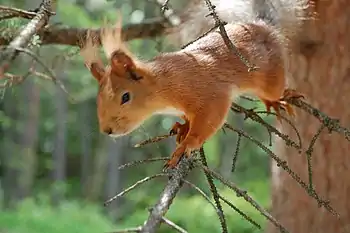< Reconstruction:Proto-Slavic
Reconstruction:Proto-Slavic/věverica
Proto-Slavic
Alternative forms
Etymology
From earlier *vě̀verь, from Proto-Balto-Slavic *wēweris, cognate to Lithuanian voverė, voverìs, vėverìs (“squirrel”), Latvian vāvere (“squirrel”), Old Prussian weware (“squirrel”), Persian وروره (varvarah), from Proto-Indo-European *wewer- (“small forest rodent”), a reduplicated form of the root *wer- (“to wrap, to turn”) (with secondary meaning “to brew, to boil”). The name may have been derived because of the typical agile locomotion of squirrels or due to their brownish to grayish coloration, associated with brewing.
Inflection
Declension of *vě̀verica (soft a-stem, accent paradigm a)
| Singular | Dual | Plural | |
|---|---|---|---|
| Nominative | *vě̀verica | *vě̀verici | *vě̀vericę̇ |
| Accusative | *vě̀vericǫ | *vě̀verici | *vě̀vericę̇ |
| Genitive | *vě̀vericę̇ | *vě̀vericu | *vě̀vericь |
| Locative | *vě̀vericī | *vě̀vericu | *vě̀vericāsъ |
| Dative | *vě̀vericī | *vě̀vericama | *vě̀vericāmъ |
| Instrumental | *vě̀vericējǫ, *vě̀vericǭ* | *vě̀vericama | *vě̀vericāmī |
| Vocative | *vě̀verice | *vě̀verici | *vě̀vericę̇ |
* The second form occurs in languages that contract early across /j/ (e.g. Czech), while the first form occurs in languages that do not (e.g. Russian).
Descendants
- East Slavic:
- South Slavic:
- West Slavic:
- Czech: veveřice, veverka
- Old Polish: wiewierzyca
- Slovak: veverica
- Sorbian:
- Upper Sorbian: wjewjerca, wjewjerčka
- Lower Sorbian: njewjerica, njewjericka
- Other:
- → Greek: βερβερίτσα (ververítsa)
- Romanian: veveriță
Further reading
- Vasmer (Fasmer), Max (Maks) (1964–1973), “веверица”, in Etimologičeskij slovarʹ russkovo jazyka [Etymological Dictionary of the Russian Language] (in Russian), translated from German and supplemented by Trubačóv Oleg, Moscow: Progress
- Vasmer (Fasmer), Max (Maks) (1964–1973), “белка”, in Etimologičeskij slovarʹ russkovo jazyka [Etymological Dictionary of the Russian Language] (in Russian), translated from German and supplemented by Trubačóv Oleg, Moscow: Progress
- Černyx, P. Ja. (1999), “белка”, in Istoriko-etimologičeskij slovarʹ russkovo jazyka [Historical-Etymological Dictionary of the Russian Language] (in Russian), volume 1, 3rd reprint edition, Moscow: Russkij jazyk, page 82
- Sreznevskij, I. I. (1893), “вѣверица”, in Materialy dlja slovarja drevne-russkago jazyka po pisʹmennym pamjatnikam [Materials for the Dictionary of the Old Russian Language According to Written Monuments] (in Russian), volume 1, Saint Petersburg: Imperial Academy of Sciences, page 477
- Georgiev Vl. I., editor (1971), “вѐверица, вѐрверица”, in Български етимологичен речник [Bulgarian Etymological Dictionary] (in Bulgarian), volume 1, Sofia: Bulgarian Academy of Sciences, page 125
- Tkačenko O. B. (1981), “Проблемы сопоставительно-исторического изучения славянских языков”, in Вопросы языкознания, volume 1, Moscow: USSR Academy of Sciences Publishing House, page 55
References
- Olander, Thomas (2001), “?věverica”, in Common Slavic accentological word list, Copenhagen: Editiones Olander: “a egern (MP 21)”
- Snoj, Marko (2016), “vẹ́verica”, in Slovenski etimološki slovar, Ljubljana: Inštitut za slovenski jezik Frana Ramovša ZRC SAZU, →ISBN, page 840: “*vě̋verica”
This article is issued from Wiktionary. The text is licensed under Creative Commons - Attribution - Sharealike. Additional terms may apply for the media files.

